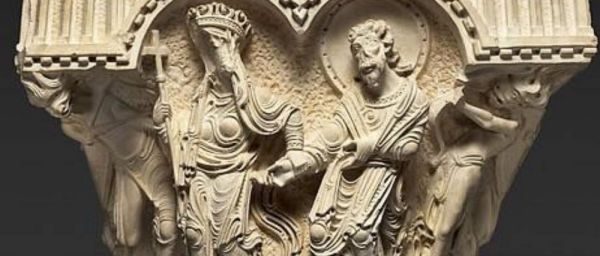End of a "sacred" order
(Lk 13:31-35)
The context in which Jesus lives is ominous: the power [even of the peripheral courts of the Empire] was absolute and accountable to no one for its petty management.
But the building of the Kingdom of God does not depend on any authorisation, on any permission, on any good-natured concession by the usual known and rapacious rulers, on the territory of the provinces.
Those who want to fulfil their mission cannot please the 'foxes' who usurp power.
They are small and harmful situational pests, but they are quick-witted - though not as big boisterous beasts as in the Roman and senatorial courts.
With his shrewd attitude, King Herod (a cunning collaborator) had managed to secure his rule for several decades, and a smooth life.
Every village in Palestine was manned by the ruler's officials and denouncers, as well as practitioners and subordinates of the official popular religion [also Pharisees, whom Jesus sends back: v.32].
Antipas always managed to float over the situation and be at peace.
But after he had deluded himself that he had settled the Baptist and with him his school, here he was again alarmed by the emergence of a greater danger.
The young Rabbi exuded confidence not in the strong, but in the weak. In this way, he worked deep in the consciences, and it seemed that he could surpass even the Prophets.
In fact, he had begun to arouse more emotions than the usual proposal of purifying the Temple and rekindling the spirit of the identity-religious, ancient origins.
Then, if from the centre of power in the land the inspectors had hastily arrived (v.31), Jesus must have really done it. Thus demonstrating total freedom from conditioning.
Therefore the success of his thought could have caused turmoil in the system.
But God's messengers do not leave risk territory, even knowing what awaits them: rejection, and worse.
True envoys do not give up, they do not allow themselves to be overwhelmed by seductions, nor beguiled by intimidators.
They do not do it out of duty, but out of loyalty to themselves, and because they are attracted by a Vision that belongs to everyone.
They are able to grasp the paradoxical fruitfulness of the Mystery, and precisely foresee that the pains of childbirth will generate new Births.
Then without more ado they go up to the city that martyrs the non-middle-aged (v.33).
All this, face to face with the opposition of the sullen and well-organised official authorities, who know how to debase the effervescence of people's lives.
Jesus and his intimates, if true followers, lead an existence marked by a kind of attraction of the cross - for Love that goes all the way and does not disdain confrontations [not because they are animated by sorrowful masochisms].
Certainly, their feeling for the fate of a homeland that indulges in vanities, the ideology of power and its 'advantage', embarking on the track of self-destruction, brings tears of sorrow.
Jerusalem was the centre of the people of God's children, "chosen" [only] to unfold the face of the Father.
The vocation of the holy city was not to surrender itself to a fox (v.32) but to become a hen [v.34: properly, "hen"] that does not close but spreads its wings for its young, gathering all the innocent.
The 'animals' that Christ in his callings proposes to us as a model are not the regal and predominant ones such as the eagle, the bull or the lion, but rather the domestic, subordinate and insignificant ones: lamb, hen, donkey, foal [e.g., "the hen", "the colt", "the lamb", "the donkey", "the colt"]. Messianic Entrance (Lk 19:28-40) followed by the Wailing over Jerusalem (vv.41-44)].
For fear of not recognising him with sufficient dignity, his traditional 'bestiary' (as triumphant and High as it was meant to be inculcated in the unwitting masses) often had nothing to do, unfortunately, with the Gospel datum.
However - although defenestrated from its House in the holy city, as well as from the hearts of those who demand only quietism - in Christ the authentic People of friends will re-propose themselves (v.35) even on the road to failure.
Not out of affected goodness: in the meantime he will have broadened the horizon of his paternity to other peoples, in favour of concrete involvement.
This without - ever again - the swampy confines of local, specific, sometimes usurping culture, which everywhere produces alienation and disintegration.
By and large, things have gone as the encyclical Fratelli Tutti (paraphrasing) subtly denounces. In short, the best way forward has been deemed in history [by the prevailing dirigiste conviction] not to integrate, but to subjugate - arousing despair and constant distrust in the development of the common good. Despair and mistrust, masked "with the defence of certain values" [n.15].The ecclesiology of triumph once served as a foil to the kind of world that tended to dissolve particular consciousnesses.
In such top-down procedures, tensions were transferred by exacerbating even 'horizontal' conflicts - then colonising them; finally silencing them [FT nn.14-15].
Living word and current history, which sooner or later must be remedied. In a simple but not one-sided way: inclusive.
Thanks to a better biblical awareness and with the contribution of a new Magisterium, the living and cosmic Jesus becomes flesh.
He gradually detaches us from the trappings of a kingdom that seemed to satisfy consciences with the scheme of order... diverting us to the cunning of Herod and the "foxes" (v.32).
To internalise and live the message:
How do you live the critical moments of Redemption? Do you go along with the normalising inspectors who try to instil fear, or do you follow your prophetic mission?
What do you think of the cultural revolution taking place in the Church? Does it solicit - disturb - confirm you as son and brother? Let us hope so.












